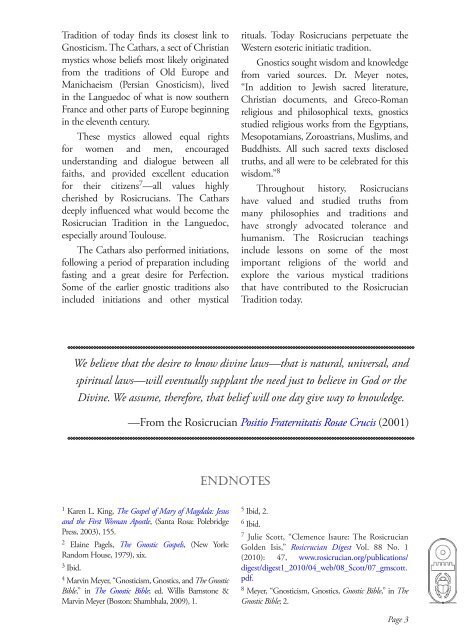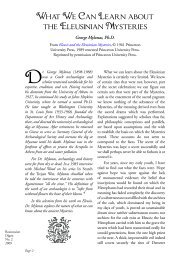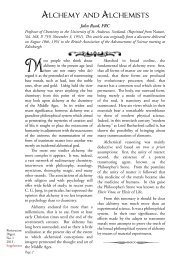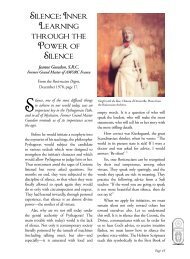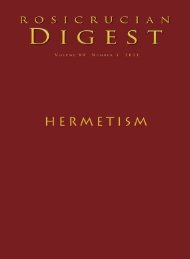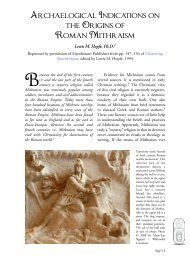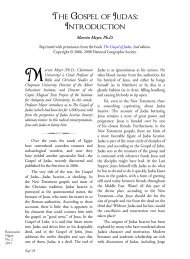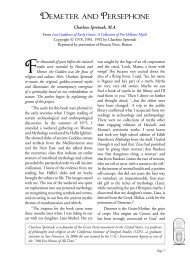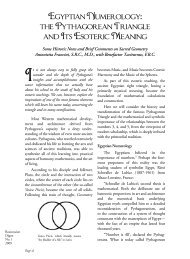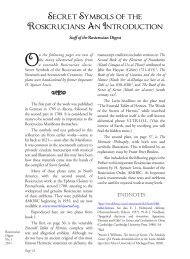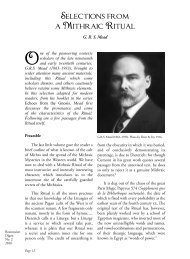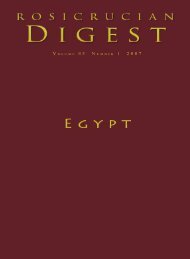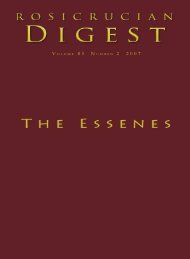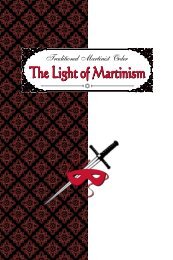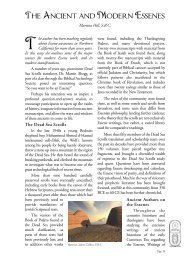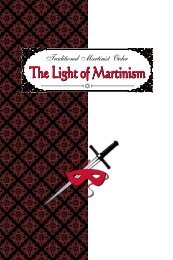Rosicrucian Digest Vol 89 No 2 2011 Gnosticism - Rosicrucian Order
Rosicrucian Digest Vol 89 No 2 2011 Gnosticism - Rosicrucian Order
Rosicrucian Digest Vol 89 No 2 2011 Gnosticism - Rosicrucian Order
Create successful ePaper yourself
Turn your PDF publications into a flip-book with our unique Google optimized e-Paper software.
Tradition of today finds its closest link to<br />
<strong>Gnosticism</strong>. The Cathars, a sect of Christian<br />
mystics whose beliefs most likely originated<br />
from the traditions of Old Europe and<br />
Manichaeism (Persian <strong>Gnosticism</strong>), lived<br />
in the Languedoc of what is now southern<br />
France and other parts of Europe beginning<br />
in the eleventh century.<br />
These mystics allowed equal rights<br />
for women and men, encouraged<br />
understanding and dialogue between all<br />
faiths, and provided excellent education<br />
for their citizens 7 —all values highly<br />
cherished by <strong>Rosicrucian</strong>s. The Cathars<br />
deeply influenced what would become the<br />
<strong>Rosicrucian</strong> Tradition in the Languedoc,<br />
especially around Toulouse.<br />
The Cathars also performed initiations,<br />
following a period of preparation including<br />
fasting and a great desire for Perfection.<br />
Some of the earlier gnostic traditions also<br />
included initiations and other mystical<br />
rituals. Today <strong>Rosicrucian</strong>s perpetuate the<br />
Western esoteric initiatic tradition.<br />
Gnostics sought wisdom and knowledge<br />
from varied sources. Dr. Meyer notes,<br />
“In addition to Jewish sacred literature,<br />
Christian documents, and Greco-Roman<br />
religious and philosophical texts, gnostics<br />
studied religious works from the Egyptians,<br />
Mesopotamians, Zoroastrians, Muslims, and<br />
Buddhists. All such sacred texts disclosed<br />
truths, and all were to be celebrated for this<br />
wisdom.” 8<br />
Throughout history, <strong>Rosicrucian</strong>s<br />
have valued and studied truths from<br />
many philosophies and traditions and<br />
have strongly advocated tolerance and<br />
humanism. The <strong>Rosicrucian</strong> teachings<br />
include lessons on some of the most<br />
important religions of the world and<br />
explore the various mystical traditions<br />
that have contributed to the <strong>Rosicrucian</strong><br />
Tradition today.<br />
We believe that the desire to know divine laws—that is natural, universal, and<br />
spiritual laws—will eventually supplant the need just to believe in God or the<br />
Divine. We assume, therefore, that belief will one day give way to knowledge.<br />
—From the <strong>Rosicrucian</strong> Positio Fraternitatis Rosae Crucis (2001)<br />
ENDNOTES<br />
1<br />
Karen L. King, The Gospel of Mary of Magdala: Jesus<br />
and the First Woman Apostle, (Santa Rosa: Polebridge<br />
Press, 2003), 155.<br />
2<br />
Elaine Pagels, The Gnostic Gospels, (New York:<br />
Random House, 1979), xix.<br />
3<br />
Ibid.<br />
4<br />
Marvin Meyer, “<strong>Gnosticism</strong>, Gnostics, and The Gnostic<br />
Bible,” in The Gnostic Bible; ed. Willis Barnstone &<br />
Marvin Meyer (Boston: Shambhala, 2009), 1.<br />
5<br />
Ibid, 2.<br />
6<br />
Ibid.<br />
7<br />
Julie Scott, “Clemence Isaure: The <strong>Rosicrucian</strong><br />
Golden Isis,” <strong>Rosicrucian</strong> <strong>Digest</strong> <strong>Vol</strong>. 88 <strong>No</strong>. 1<br />
(2010): 47, www.rosicrucian.org/publications/<br />
digest/digest1_2010/04_web/08_Scott/07_gmscott.<br />
pdf.<br />
8<br />
Meyer, “<strong>Gnosticism</strong>, Gnostics, Gnostic Bible,” in The<br />
Gnostic Bible; 2.<br />
Page 3


